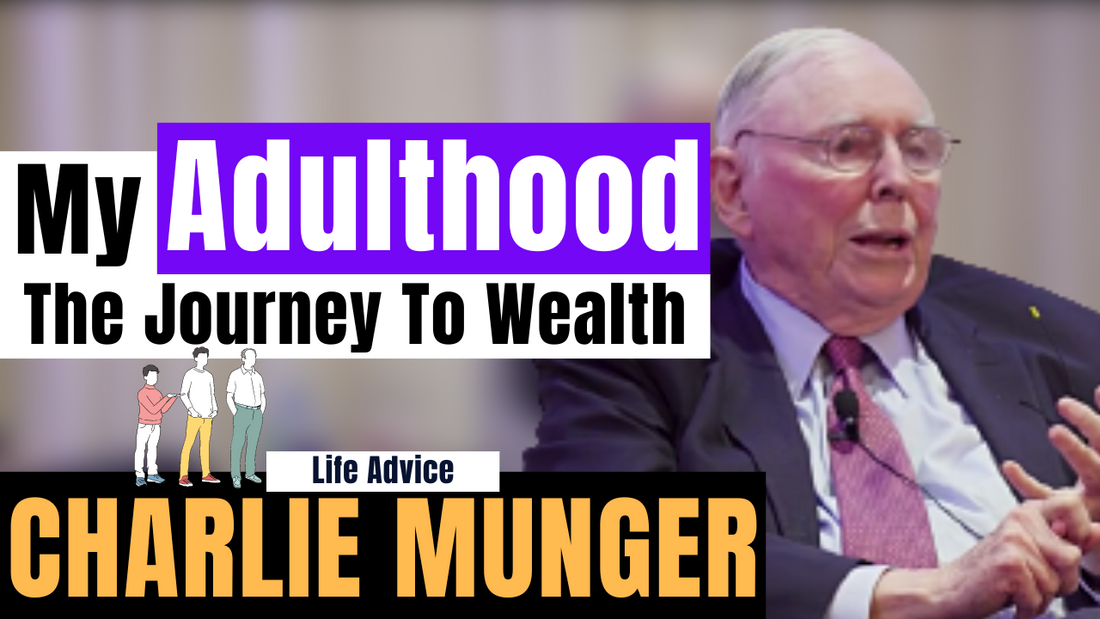
Charlie Munger's Adulthood; The Journey To Wealth. | Michigan Ross 2017【C:C.M Ep.225】
[Transcript]
SCOTT DERUE: So you grow up in Omaha, Nebraska. You find yourself in Ann Arbor Michigan, how does that happen?
CHARLIE MUNGER: Very simple. I wanted to go to Stanford. (Laughter)
And my father said to me, Charlie – I was the only son, two sisters – he says I've got two daughters that have to be educated right after you. I don't have unlimited money, he says I will send you to Stanford if it really means a great deal to you. But I'd rather you pick a university in the Midwest much better than mine, which was the University of Nebraska, and that was obviously going to be Michigan.
What was I gonna say, screw you send me to Stanford? (Laughter)
Well, I didn't say that, I went to Michigan.
SCOTT DERUE: So, you come to Michigan –
CHARLIE MUNGER: I have never regretted that at all. (Applause)
At Stanford – People came to Stanford in the 30s with their string of polo ponies. It was a very upscale fraternity-sorority culture. I used to call it the co-educational Princeton of the West. And people loved it and so forth but literally, you go to Stanford with a string of polo ponies.
I should say I'm bringing back to you, young people, a time you can't remember. Who did you ever know in college that came with a string of polo ponies?
SCOTT DERUE: Not very many people.
CHARLIE MUNGER: No, they go – they'd be in the ROTC, but they had their own string of polo ponies. You could win better if you have your own string. (Laughter)
SCOTT DERUE: So you come to Michigan, and you study math for a year.
CHARLIE MUNGER: Yes, but I don't get credit for that.
When I was young, I could get an A in any mathematics course without doing any work at all. And so I always took math because it meant that I could literally never did any problems sets. I just did the math and so I should not get credit as some budding mathematician.
I was choosing what for me was the easiest way to think about what I want to do, instead of what somebody else wants me to do.
SCOTT DERUE: Come to find out that it ended up being a subject that has I think paid some dividends?
CHARLIE MUNGER: Oh hugely! But this will interest you, in this world where people have all these algorithms and computer science and fancy math, and so forth.
Neither Warren or I have ever used any fancy math in business, and neither did Ben Graham, who taught Warren. Everything I've ever done in business could be done with the simplest algebra and geometry and addition, multiplication and so forth. I never used calculus for any practical work in my whole damn life. And I was a perfect whiz at it when they taught it to me.
And by the way, since I never touched calculus not one after I was 19 years old, I've lost it. The symbols would mystify me. But I think you'll find that if you really know the basic stuff, it's enormously useful and only a very few people are ever going to need any calculus.
SCOTT DERUE: So you study math at Michigan then the war comes calling?
CHARLIE MUNGER: Yeah.
SCOTT DERUE: You moved to California, and you study meteorology.
CHARLIE MUNGER: Well, that was because I was too dumb to do what I should have done.
With my background, I should have gone to the naval ROTC, because I hated infantry ROTC, which I'd done four years of it – high school – rising to be the second lieutenant which is a very low rank. (Laughter)
And of course, I was about five feet-two – I got my growth late, so I was not your ideal of a manly soldier in high school.
SCOTT DERUE: So, when you went to Harvard Law – why law?
CHARLIE MUNGER: Well, my grandfather and father had been lawyers, and I knew I didn't want to do everything else, it's very simple.
I didn't want to be a doctor. I didn't want all the blood and misery and so forth, and the repetitive work. I knew I didn't want to go to the bottom of a big organization, and crawl my way up.
I'm a natural contrarian and that was not going to work for me. And I found that people could tell me when I thought they were idiots, and that is not a way to rise in a big organization, and so I couldn't do that. And so now I'm left with law.
And I admired my father and grandfather, and they had a good life for them, so I naturally drifted into it. I think people are still going to law school for that reason, it's the least bad of options considering their interests and ability.
I guess now people go to business school some of the move, my day they go to law school. Many of the people in this room I think are going to go to business school, and that's the least bad of their options. (Laughter)
And all I can say that that's the way it worked for me, and it'll probably worked out for you.
SCOTT DERUE: Did it worked out okay?
CHARLIE MUNGER: It worked out okay, but I had to leave the profession. It was a dumb profession for me.
SCOTT DERUE: So, that's actually what I want to ask, so you moved to California you actually start a law firm and then practice law for some period of time.
CHARLIE MUNGER: I had no alternative. (Laughter)
I had an army of children almost immediately. (Laughter)
I painted myself in quite a corner. (Laughter)
SCOTT DERUE: So zero choice is pretty powerful?
CHARLIE MUNGER: Yes, yes of course.
SCOTT DERUE: So you practice law, and then you leave law, in the firm that you helped found, and move over to investments?
CHARLIE MUNGER: Well, but that sounds miraculous. (Laughter)
In fact, it was rather interesting. I probably got paid about $350,000 in my first 13 years of law practice, total. And I had an army of children and no capital to start with. And when I chose this alternative career, I had over $300,000 in liquid instruments.
So I had and that was 10 years of living expenses, so I was not a courageous venturesome or some admirable man. I was a cautious little squirrel – (Laughter) – saving up more nuts than I really needed it and not going very deep into my pile of nuts.
And it wasn't that courageous, and I kept one foot in the law firm while I tried my capitalist career, but as soon as the capitalist career succeeded I intended to lift that second foot, because I recognized that the potential of law practice as I saw it then. I didn't anticipate the boom that came to the big firms. I just saw this being more difficult. I wanted more independence than I was going to have as a lawyer.
I hated sending other people invoices and needing money from richer people. I thought it was undignified. I wanted my own money, not because I loved ease or social prestige, I wanted the independence.
SCOTT DERUE: Well, and when you so you founded Wheeler, Munger & Co., so that was the investment firm.
CHARLIE MUNGER: Yes and I have 5 real estate projects I did both side by side for a few years, and in a few years I had three or four million dollars.
SCOTT DERUE: And for a number of years you outperform the market 2x, 3x, and so why did you then leave Wheeler, Munger & Co. and then move to now what you're doing?
CHARLIE MUNGER: Well, I had three or four million dollars which was a lot of money then. I also knew how to handle that three or four million dollars very well at that time.
And so I knew I didn't need to get fees and override some other investors, and I found that when you got into things like this '74-75 crunch which was the worst since the 30s, I didn't suffer I knew everything was going to work out but the quoted prices of these things really went down to ridiculous levels.
Some of my investors I knew were suffering, you know, they needed the money. And of course, I have enough of fiduciary gene that pained me greatly, and so I said it's just it's like when my grandfather once they asked him how he felt when my aunt divorced my uncle, he said I feel just the way I did when they lanced my carbuncle.
And that's the way I – I had a carbuncle, my fiduciary gene was giving me pain, and I lanced the carbuncle and I just lived on my own money. No fees, no overrides, no salary. Just seemed more manly to do when I knew it would work.
(Source: https://youtu.be/S9HgIGzOENA)
[YAPSS Takeaway]
Spend some time to understand about yourself, know what you can and know what you can't.
